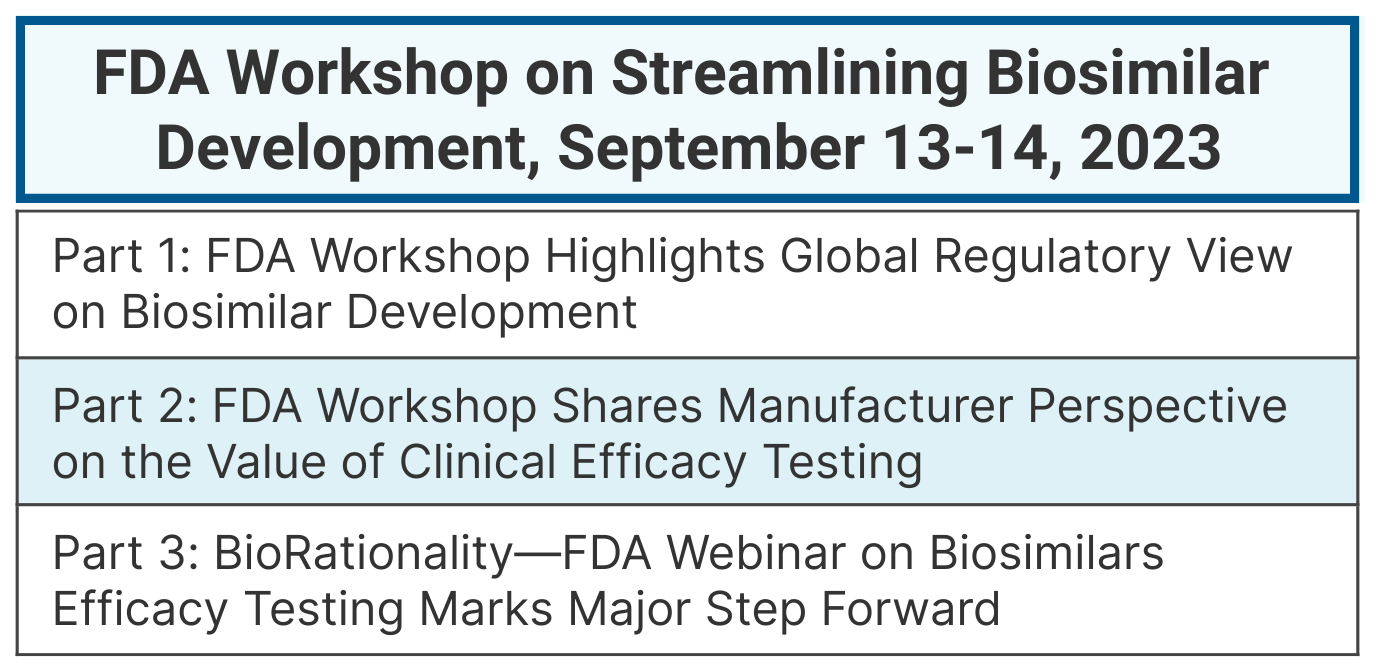
- Bone Health
- Immunology
- Hematology
- Respiratory
- Dermatology
- Diabetes
- Gastroenterology
- Neurology
- Oncology
- Ophthalmology
- Rare Disease
- Rheumatology
Part 2: FDA Workshop Shares Manufacturer Perspective on the Value of Clinical Efficacy Testing
Although removing the requirement for clinical efficacy testing for biosimilar approval would reduce development costs of biosimilars, representatives from several biosimilar manufacturers argued in the second day of the FDA’s development workshop that clinical outcomes will not be affected.

Click here for Part 1. Part 3 is also available now.
On day 2 of the FDA’s workshop on increasing efficiency within the biosimilar development program, speakers from different biosimilar manufacturers shared their experiences with clinical effectiveness testing and what needs to be done to ensure the sustainability of the biosimilars market.
The workshop focused on reevaluation of the need for comparative clinical efficacy studies for biosimilars, which many experts have argued are unnecessary and expensive trials that do not provide any sufficient information beyond the data that are already presented in preclinical and pharmacodynamic (PD)/pharmacokinetic (PK) studies.
Day 1 of the event hosted representatives from global regulatory agencies to discuss how comparative efficacy studies are being used in biosimilar evaluations and what agencies have learned over time about the value of these trials. The speakers represented Sandoz, Samsung Bioepis, Fresenius Kabi, KRW Bio Reg Solutions, Biocon, and Teva Pharmaceuticals. The discussion also featured a clinical pharmacologist based in Spain to offer a researcher’s perspective on clinical efficacy studies.
The main takeaway from the discussion was that clinical efficacy studies should not be required for approval because data over time have shown that they don’t provide any additional relevant data on the safety and efficacy of a biosimilar compared with the data presented in PD/PK studies, a sentiment that experts throughout the biosimilar industry have been echoing for years.
Biosimilars can take an average of 8 to 10 years to develop and cost between $100 million and $300 million.

The primary factors that drive the costs associated with biosimilar development are recruitment of patients for clinical efficacy trials and procurement of the reference medication to compare with the biosimilar candidate. Elena Wolf-Holz, vice president global head clinical development at Biocon Biologics, argued that the removal of clinical efficacy testing doesn’t have to mean an end to rigorous analyses to ensure biosimilar safety.
“I think it's fair to say, from an industry's perspective, that [running large clinical efficacy trials] is questionable. I think the question is, do we really always need these equivalence trials? Do we need the margins set the way that they’re currently set? Are there new statistical models that could be considered, for example, Bayesian approaches or other such things? So, it's not all or nothing.”
Additionally, reducing the costs associated with biosimilar development as well as the time to complete biosimilarity comparisons will make it more feasible for companies to invest in biosimilar development. Gillian Wollett, MA, DPhil, vice president and head of regulatory strategy and policy at Samsung Bioepis, noted that calls to remove requirements for clinical efficacy studies as well as animal toxicology studies for biosimilars are based on the buildup of science over the years and that the scientific needs of times past should be updated to reflect new information.
“Streamlining biosimilar development with no unnecessary comparative efficacy studies is absolutely essential to their expanded availability to more originator biologics. It's fundamentally critical to the feasibility of making biosimilars. The current cost of development per product—100 times the average generic—is just not viable for biosimilars to be available for all originator biologics at [the time of] loss of exclusivity.”
Another big topic of discussion was the need for more consistent regulatory guidelines worldwide. When developing biosimilars, companies need to cater to the regulatory requirements of multiple regions to ensure their products can be available in all major markets. However, this can result in added costs for clinical testing, extended development timelines, and delayed market access.
“We need clarity and evolution of the existing guidance that are designed with the genuine intent to guardrail the progress of a new category of drugs in somewhat uncharted territories…The body of evidence demonstrating efficacious, safe, and well-adopted biosimilars is irrefutable. If the science that will lead to the evolution of guidelines is materially moving towards the right direction…it is equally important to strive for regulatory convergence—aiming for guidelines that are considerate of truly worldwide global development,” commented Fabrice Romanet, senior vice president program leadership, regulatory and government at Fresenius Kabi.
Newsletter
Where clinical, regulatory, and economic perspectives converge—sign up for Center for Biosimilars® emails to get expert insights on emerging treatment paradigms, biosimilar policy, and real-world outcomes that shape patient care.
259 Prospect Plains Rd, Bldg H,
Cranbury, NJ 08512
All rights reserved.